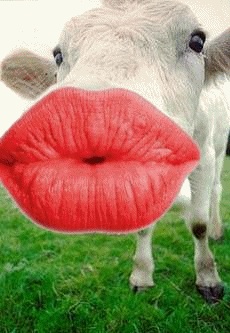With 57 children sick with E. coli O157 linked to petting farms in the U.K., and 10 still in hospital, farm owners said they would oppose a ban on small children visiting the attractions, and one of the owners said the risk is being greatly overblown.
.jpg) The U.K. government has rightly decided to ignore such statements and is preparing to upgrade E. coli O157 to a "notifiable disease" – on a par with infections like smallpox and measles – to speed up detecting outbreaks.
The U.K. government has rightly decided to ignore such statements and is preparing to upgrade E. coli O157 to a "notifiable disease" – on a par with infections like smallpox and measles – to speed up detecting outbreaks.
With a half-dozen foodborne illness outbreaks of E. coli and Salmonella throughout the U.K. being reported in the past week, yes, maybe they should be notifiable disease(s).
Maybe I’m losing something in translation.
Hugh Pennington, emeritus professor of bacteriology at the University of Aberdeen and Groundhog Day enthusiast has seen all this before.
Pennington told The Times E coli O157 was prevalent in cows, sheep and goats, with research showing about one in 10 cows carried the bug and 40% of herds. He called for the Health and Safety Executive (HSE) guidelines on petting farms to be reviewed and a minimum age introduced.
.jpg) “There will have to be a look at the guidelines to see if they need tightening and a review of whether they are being properly followed.”
“There will have to be a look at the guidelines to see if they need tightening and a review of whether they are being properly followed.”
This is the problem: there are plenty of guidelines out there to manage all sorts of risks, food-related or otherwise, but do people really do what they say they do? Or do they really think, it’s no biggie.
In the wake of the outbreak, the U.K. has closed four such petting farms, either linked directly to the outbreak or, their standards sucked.
My friend Scott Weese, a veterinarian researcher at the University of Guelph and host of the Worms and Germs blog, wrote earlier today that:
Considering all of the outbreaks that have been attributed to petting zoos, including an outbreak in the UK this month that has sickened dozens and another in Vancouver has affected at least 13 people, you would think that people who operate petting zoos would start to get the clue. Unfortunately, that’s clearly not the case.
My family and I went to the Fergus (Ontario) Fall Fair today. Apart from the petting zoos, it was a great day, but the potential for ending up in hospital with a life-threatening infection shouldn’t have to be a concern for fair attendees.
This fair has two petting zoos. One is in association with a pony ride. We went there first and while my kids were looking at the animals, I noticed there was a table and a sign saying to use a hand sanitizer after touching the animals, but there were not actually any hand sanitizers present. I asked the attendant and he immediately started looking. They eventually found some but we gave up after waiting a few minutes and went to the other petting zoo location because a handwashing station was present there. Despite a large crowd around the first petting zoo, I didn’t see anyone following our actions so presumably almost no one washed their hands after petting the animals. The good thing about this first petting zoo was they had a clean facility, appropriate animals and no major problems apart from the forgotten sanitizers.
.jpg) Petting zoo number 2 was not as good. There were numerous problems, some of them very major.
Petting zoo number 2 was not as good. There were numerous problems, some of them very major.
* Inappropriate animals #1: As we walked in, someone held out a baby chick and tried to give it two my 2-yr-old daughter to handle. Standard guidelines are that children under 5 should not handle young poultry, so these animals are inappropriate for any petting zoo.
* Inappropriate animals #2: The next thing we passed was a young calf. Calves are also considered a high-risk animal and should not be present in petting zoos.
* Inappropriate animals #3: The calf had diarrhea (see the diarrhea staining and hair loss probably associated with prolonged diarrhea in picture). It’s very likely that this calf was shedding one or more infectious agents in its diarrhea, such as Cryptosporidium.
* Food for sale: Food was being sold and consumed inside the tent where the petting zoo was. This is inappropriate.
Petting zoos can be great events for kids. They can also be sources of large and serious outbreaks.
Hopefully nothing bad will come from this and we won’t hear reports of illness in petting zoo participants. But, as I’ve said before, hope is not a proper infection control program.
Anyone having a petting zoo must know the issues, risks and proper measures. Reading the Compendium of measures to prevent disease associated with animals in public settings would be a good start.
A leading personal injury lawyer, Jill Greenfield, a partner at Field Fisher Waterhouse in the U.K., told The Independent that she has received instruction from a family involved and expects a class action. In 2001, she represented Tom Dowling, who was awarded damages of £2.6m after he contracted E. coli as a four-year-old during a school trip to a north London farm in 1997, which resulted in his becoming quadriplegic and brain damaged. His was the third case of E. coli at the farm within a few months.
 "We need to establish what went wrong and who if anyone is at fault. I would hope that the farm representatives and the Health Protection Agency (HPA) will agree to meet with me as soon as possible in order that I can establish the facts as quickly as possible.
"We need to establish what went wrong and who if anyone is at fault. I would hope that the farm representatives and the Health Protection Agency (HPA) will agree to meet with me as soon as possible in order that I can establish the facts as quickly as possible.
.jpg) The Health Protection Agency (HPA) said the total number of E.coli cases linked to Godstone Farm had risen to 67.
The Health Protection Agency (HPA) said the total number of E.coli cases linked to Godstone Farm had risen to 67..jpg) Instead,
Instead, .jpg) • 64 kids sick with E. coli O157 is not hysteria, it sucks;
• 64 kids sick with E. coli O157 is not hysteria, it sucks;.jpg) The U.K. government has rightly decided to ignore such statements and is preparing to
The U.K. government has rightly decided to ignore such statements and is preparing to .jpg) “There will have to be a look at the guidelines to see if they need tightening and a review of whether they are being properly followed.”
“There will have to be a look at the guidelines to see if they need tightening and a review of whether they are being properly followed.”.jpg) Petting zoo number 2 was not as good. There were numerous problems, some of them very major.
Petting zoo number 2 was not as good. There were numerous problems, some of them very major. Speaking from his bedside at Queen Mary’s Hospital in Sidcup, Kent, Harry’s father, Lee Dolby, said he was ”disgusted” at the failure of the farm and the HPA to act promptly.
Speaking from his bedside at Queen Mary’s Hospital in Sidcup, Kent, Harry’s father, Lee Dolby, said he was ”disgusted” at the failure of the farm and the HPA to act promptly. The Vancouver Sun reports
The Vancouver Sun reports.jpg) "I wanted to speak personally to the parents of those children who are most seriously ill in hospital to explain what has happened and, however inadequate under the circumstances, to apologise.
"I wanted to speak personally to the parents of those children who are most seriously ill in hospital to explain what has happened and, however inadequate under the circumstances, to apologise. Todd underwent a second blood transfusion yesterday – the day a 13th child was hospitalised – after the brothers had suffered acute kidney failure.
Todd underwent a second blood transfusion yesterday – the day a 13th child was hospitalised – after the brothers had suffered acute kidney failure. Another toddler, Alfie Weaver, was being monitored by doctors at East Surrey Hospital in Redhill, where he also had blood transfusions.
Another toddler, Alfie Weaver, was being monitored by doctors at East Surrey Hospital in Redhill, where he also had blood transfusions..jpg) The story triumphantly declares that it was the first time the PNE has been linked to cases of E. coli since the agricultural fair opened in 1910.
The story triumphantly declares that it was the first time the PNE has been linked to cases of E. coli since the agricultural fair opened in 1910. The Health Protection Agency (HPA) said there were now 13 youngsters being treated, of which four were seriously ill and six were in a stable condition.
The Health Protection Agency (HPA) said there were now 13 youngsters being treated, of which four were seriously ill and six were in a stable condition.